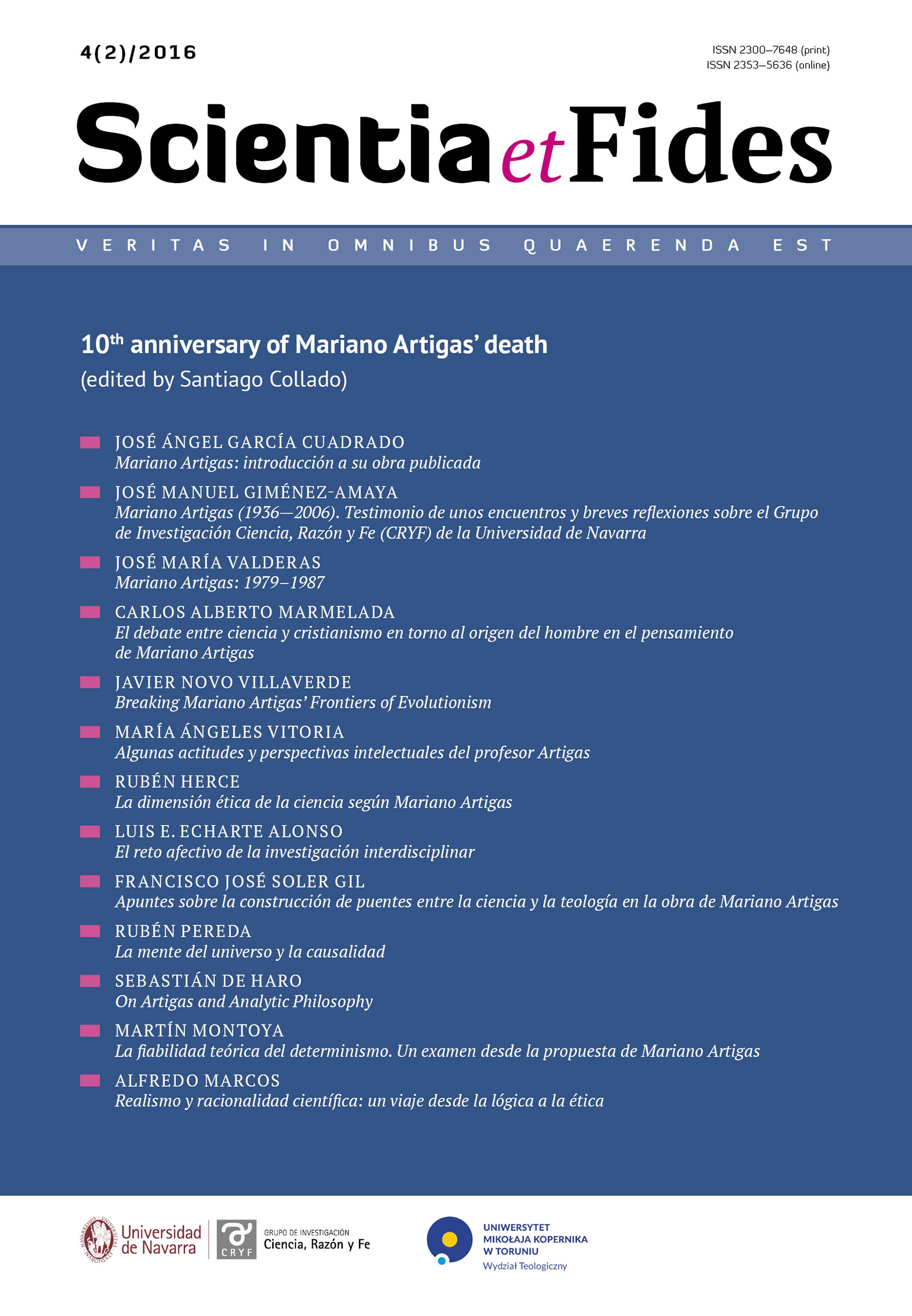La fiabilidad teórica del determinismo. Un examen desde la propuesta de Mariano Artigas
Słowa kluczowe
causation, empirical sciences, explanation, human freedom.Abstrakt
The theoretical reliability of determinism.
A review from the proposal of Mariano Artigas
This article has two purposes. The first is to demonstrate that the theory of determinism, which claims to be based on the principles of experimental science, cannot be considered as an explanation compatible with such sciences. To do this, we use some ideas of Mariano Artigas on the explanatory power of scientific theories and their reliability from his book The Mind of the Universe. Through this process we seek to achieve the second objective: to show the importance of the work of Artigas to dissolve complex contemporary debates, such as the current discussion about the existence of human freedom.
Bibliografia
Alexander, P., A. Schlegel, W. Sinnott-Armstrong, A. Roskies, P. U. Tse, y T. Wheatley. 2015. “Dissecting the Readiness Potential. An Investigation of the Relationship between Readiness Potentials, Conscious Willing, and Action.” En Surrounding Free Will. Philosophy, Psychology, Neuroscience, editado por A. Mele, 203–230. Oxford: Oxford University Press.
Artigas, M. 1999. La mente del universo. Pamplona: Eunsa. Publicado en inglés como The mind of the universe: understanding science and religion (Radnor, Penn: Templeton Foundation Press, 2000).
Balaguer, M. 2009a. “The Metaphysical Irrelevance of the Compatibilism Debate (and, More Generally, of Conceptual Analysis).” The Southern Journal of Philosophy 47:1–24.
Balaguer, M. 2009b. “Why there are no good arguments for any interesting version of determinism.” Synthese 168:1–21.
Campbell, J. K. 2011. Free Will. Cambridge. UK: Polity Press.
Churchland, P. 2011. Braintrust. New Jersey: Princeton University Press.
Churchland, P. 2013. “The benefists of realising you’re just a brain. An interview of Grahan Lawton.” New Scientist. New Scientist Nov. 27:30–31. http://www.newscientist.com.
Clarke, R. 2014. “Freedom, Responsibility, and Omitting to Act.” En Libertarian Free Will. Contemporary Debates, editado por D. Palmer, 107–123. Oxford: Oxford University Press.
Fischer, J. M. 2007. “Compatibilism.” En Four Views on Free Will, editado por E. Sosa, 44–84. Massachusetts: Blackwell Publishing.
Fischer, J. M. 2010. “The Frankfurt cases: The moral of the stories.” Philosophical Review 119:315–336.
Frankfurt, H. 1969. “Alternate Possibilities and Moral Responsibility.” The Journal of Philosophy 66:829–839.
Ginet, K. 2014. “Can an Indeterministic Cause Leave a Choice Up to the Agent?” En Libertarian Free Will. Contemporary Debates, editado por D. Palmer, 27–34. Oxford: Oxford University Press.
Hintikka, J. 1973. Time and Necessity. Oxford: Oxford Clarendon Press.
Hintikka, J. 1979. “Necessity, Universality and Time in Aristotle.” En Articles on Aristotle. 3. Metaphysics, editado por J. Barnes, M. Schofield y R. Sorabji, 108–124. London, Duckworth.
Hoefer, C. 2015. “Causal Determinism.” En The Stanford Encyclopedia of Philosophy, editado por E. N. Zalta. http://plato.stanford.edu/archives/fall2015/entries/determinism-causal/
Honderich, T. 2011. “Effects, Determinism, neither Compatibilism nor Incompatibilism, Consciousness.” En The Oxford Handbook of Free Will, 2nd ed., editado por R. Kane, 442–456. Oxford: Oxford University Press.
Kane, R. 2007. “Libertarianism.” En Four Views on Free Will, editado por E. Sosa, 5–43. Massachusetts: Blackwell Publishing.
Kane, R. 2014. “New Arguments in Debate on Libertarian Free Will: Responses to Contributors.” En Libertarian Free Will. Contemporary Debates, editado por D. Palmer, 179–214. Oxford: Oxford University Press.
Libet, B., C. A. Gleason, E. Wright y D. Pearl, 1983. “Time of Conscious Intention to Act in Relation to Onset of Cerebral Activity (Readiness-potential). The Unconscious Initiation of a Freely Voluntary Act.” Brain 106:623–642.
Liz, Manuel. 2007. “El mundo físico y el mundo. Otros fisicalismos también son posibles.” En Pluralidad de la filosofía analítica, editado por D. P. Chico y M. Barroso, 95–128. Madrid–México: Theoria cum Praxi.
Murillo, J. I., y J. M. Giménez Amaya. 2008. “Tiempo, conciencia y libertad: consideraciones en torno al experimento de B. Libet y colaboradores.” Acta Philosophica 17:291–306.
O’Connor, T. 2002. “Libertarian Views: Dualist and Agent-Causal Theories.” En The Oxford Handbook of Free Will, editado por R. Kane, 337–355. Oxford: Oxford University Press.
O’Connor, T. 2011. “Agent-Causal Theories of Freedom.” En The Oxford Handbook of Free Will, 2nd ed., editado por R. Kane, 309–328. Oxford: Oxford University Press.
O’Connor, T. 2014. “Free Will and Metaphysics.” En Libertarian Free Will. Contemporary Debates, editado por D. Palmer, 27–34. Oxford: Oxford University Press.
Pink, T. 2004. Free Will. A Very Short Introduction. Oxford: Oxford University Press.
Sellars, W. 1966. “Fatalism and Determinism.” En Freedom and Determinism, editado por K. Lehrer, 141–174. New York: Random House.
Strawson, P. F. 1962. “Freedom and Resentment.” Proceedings of the British Academy 48:187–211.
Suhler, C. y P. Churchland. 2011. “Control: conscious and otherwise.” Trends in Cognitive Sciences 8:341–347.
Van Inwagen, P. 1983. An Essay on Free Will. Oxford: Oxford University Press.
Van Inwagen, P. 1998. “The Mystery of Metaphysical Freedom.” En Metaphysics: The Big Questions, editado por P. Van Inwagen y D. Zimmerman. Oxford: Blackwell.
Vihvelin, K. 2011. “Arguments for Incompatibilism.” En The Stanford Encyclopedia of Philosophy, editado por E. N. Zalta. http://plato.stanford.edu/entries/incompatibilism-arguments/.
Wegner, D. 2002. The Illusion of Conscious Will. Cambridge Massachusetts: MIT Press.
Wiggins, D. 1987. “Towards a Reasonable Libertarianism.” En Needs, Values, Truth. Essays in the Philosophy of Value, 269–302. London: Oxford University Press.
Zimmerman, M. 1997. “Moral Responsibility and Ignorance.” Ethics 107:410–426.
Pobrania
Opublikowane
Jak cytować
Numer
Dział
Licencja
CC BY ND 4.0. Posiadaczem prawa autorskiego (Licencjodawcą) jest Autor, który na mocy umowy licencyjnej udziela nieodpłatnie prawa do eksploatacji dzieła na polach wskazanych w umowie.
- Licencjodawca udziela Licencjobiorcy licencji niewyłącznej na korzystanie z Utworu/przedmiotu prawa pokrewnego w następujących polach eksploatacji: a) utrwalanie Utworu/przedmiotu prawa pokrewnego; b) reprodukowanie (zwielokrotnienie) Utworu/przedmiotu prawa pokrewnego drukiem i techniką cyfrową (e-book, audiobook); c) wprowadzania do obrotu egzemplarzy zwielokrotnionego Utworu/przedmiotu prawa pokrewnego; d) wprowadzenie Utworu/przedmiotu prawa pokrewnego do pamięci komputera; e) rozpowszechnianie utworu w wersji elektronicznej w formule open access na licencji Creative Commons (CC BY-ND 3.0) poprzez platformę cyfrową Wydawnictwa Naukowego UMK oraz repozytorium UMK.
- Korzystanie przez Licencjobiorcę z utrwalonego Utworu ww. polach nie jest ograniczone czasowo ilościowo i terytorialnie.
- Licencjodawca udziela Licencjobiorcy licencji do Utworu/przedmiotu prawa pokrewnego nieodpłatnie na czas nieokreślony
PEŁEN TEKST UMOWY LICENCYJNEJ >>
Statystyki
Liczba wyświetleń i pobrań: 619
Liczba cytowań: 1



